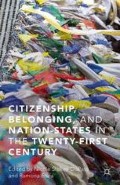Abstract
Despite its massive wealth and efforts to put itself in the international spotlight, Qatar remains a rather obscure country, certainly in its contribution to social science theories regarding nationality, citizenship, and identity. However, in its trajectory from fairly recent national independence to a major crossroads of globalization, Qatar, like its peers in the Arab Gulf region, represents a revealing incubator for rapid economic power and great ambition, which evokes national identity issues. Thus, it is high time that countries like Qatar should be studied for the experience they might contribute to the knowledge of social science. This chapter takes a modest step in this direction, specifically in terms of how Qatari nation-building has required a strong state.
Some of the work for this chapter is based on research conducted under NPRP Grant 6-459-5-050 from the Qatar National Research Fund
Access this chapter
Tax calculation will be finalised at checkout
Purchases are for personal use only
Preview
Unable to display preview. Download preview PDF.
References
Babar, Zahra. 2014. “The cost of belonging: Citizenship construction in the state of Qatar.” The Middle East Journal 68 (Summer): 403–420.
Beblawi, Hazem, and Giacomo Luciani. 1990. “The rentier state in the Arab World.” In Giacomo Luciani (ed.), The Arab State (pp. 85–99 ). London: Routledge.
Bulletin, Labour Force Statistics 2013. Government of Qatar. Retrieved September 5, 2015, from http://www.qix.gov.qa/portal/page/portal/QIXPOC/Documents/QIX%20Knowledge%20Base/Publication/Labor%20Force%20Researches/labor%20force%20sample%20survey/Source_QSA/Labour_Force_Statistics_MDPS_Bu_AE_2013.pdf
cooke, miriam. 2014. Tribal Modern: Branding New Nations in the Arab Gulf. Berkeley: University of California Press.
Dicken, Peter. 2011. Global Shift: Reshaping the Global Economic Map in the 21st Century ( 6th ed. ). London: Guilford Press.
DLA Piper. 2014. Migrant labour in the construction sector of Qatar. Retrieved September 7, 2015, from http://www.engineersagainstpoverty.org/documentdownload.axd?documentresourceid=58
Fromherz, Allen. 2012. Qatar: A Modern History. Washington, DC: Georgetown University Press.
Gardner, Andrew. 2012. “Why do they keep coming? Labor migrants in the Gulf states.” In Mehran Kamrava and Zahra Babar (eds.), Migrant Labor in the Persian Gulf (pp. 41–58 ). London: Hurst & Company.
Held, David (ed.). 2000. A Globalizing World?: Culture, Economics, Politics. London: Routledge.
Herb, Michael. 1999. All in the Family: Absolutism, Revolution and Democracy in the Middle Eastern Monarchies. Albany: State University of New York Press.
Kamrava, Mehran. 2013. Qatar: Small State, Big Politics. Ithaca, NY: Cornell University Press.
Kinnemont, Jane. 2013. “Citizenship in the Gulf.” In Ana Echagüe (ed.), The Gulf States and the Arab Uprisings (pp. 47–58 ). Spain: FRIDE and the Gulf Research Center.
Mednicoff, David. 2011. “National security and migration: The view from contemporary Persian Gulf societies.” Western New England Law Review 33(1): 121–162.
Mednicoff, David. 2012. “The legal regulation of migrant workers, politics and identity in Qatar and the United Arab Emirates.” In Mehran Kamrava and Zahra Babar (eds.), Migrant Labor in the Persian Gulf (pp. 187–215 ). London: Hurst & Company.
Ohmae, Kenichi. 1995. The End of the Nation State. New York: Free Press.
Editor information
Copyright information
© 2016 David Mednicoff
About this chapter
Cite this chapter
Mednicoff, D. (2016). Change, Challenge, and Continuity in Qatari Development: Identity and Citizenship in the Fulcrum of Hyper-Globalization. In: Stokes-DuPass, N., Fruja, R. (eds) Citizenship, Belonging, and Nation-States in the Twenty-First Century. Palgrave Macmillan, New York. https://doi.org/10.1007/978-1-137-53604-4_5
Download citation
DOI: https://doi.org/10.1007/978-1-137-53604-4_5
Publisher Name: Palgrave Macmillan, New York
Print ISBN: 978-1-349-55624-3
Online ISBN: 978-1-137-53604-4
eBook Packages: Social SciencesSocial Sciences (R0)

